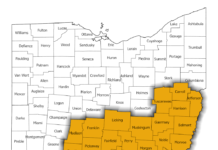KANSAS CITY, Mo. — This harvest season, the focus for many is on lower commodity prices. A new report issued by AgriBank, the St. Paul-based Farm Credit Bank, takes a look at the resulting moderation of farmland values.
In the 15-state AgriBank district, which stretches from Wyoming to Ohio and Minnesota to Arkansas, average cropland and pastureland values slowed in growth, but did not decline, in 2015, driven by considerably lower commodity prices that result in lower net farm incomes in the grains and oilseeds sector.
Rents, real estate value
District average cash rents for cropland declined for the first time in over 20 years, while the region’s average cash rents for pastureland increased.
Real estate values changed from -10.5 percent to 10.6 percent over the 12-month period ending June 30, 2015, according to the AgriBank survey.
The district’s “implied” cropland capitalization rate held virtually steady above the 10-year Treasury rate over recent years, indicating that the market continues to build in a risk premium that exceeds the expected growth in returns to cropland.
“States heavily concentrated in corn and soybean production experienced declines in cropland values, while values in states with more diversified crops, including wheat and rice, continued to increase, albeit at a more moderate pace,” said Jeff Swanhorst, AgriBank executive vice president of credit and chief credit officer.
Outlook
“The outlook for most crop producers looks challenging for the next five years with most forecasters projecting corn and soybean prices to be at or near break-even levels,” Swanhorst said. “Producers may benefit from USDA commodity title programs that could be triggered by lower commodity prices.”
Fed survey
The St. Louis Fed also conducted its third-quarter ag survey, and found farm income continued to decline across its territory in the Midwest and the Mid-South, compared with the previous year.
The Federal Reserve Bank of St. Louis suyrveyed 38 agricultural banks in the Eighth Federal Reserve District, which comprises all or parts of Arkansas, Illinois, Indiana, Kentucky, Mississippi, Missouri and Tennessee.
Farm income
During the third quarter, bankers reported a continued drop in farm income compared with the same period a year ago.
Based on a diffusion index methodology with a base of 100 (results above 100 indicate proportionately higher income compared with the same quarter a year earlier; results lower than 100 indicate lower income), the farm income index value was 61 for the third quarter of 2015. This was the fifth consecutive quarter that this value fell below 100.
Due to some concern about the fall harvest and the recent dip in livestock prices, agricultural bankers have a rather dour view of farm income prospects in the fourth quarter of 2015, the report said, noting a projected fourth quarter index value of 23.
Given lower income levels, farmers and ranchers continued to scale back spending, with values for the index for household spending and the index for capital equipment expenditures falling to their lowest levels since the survey began in 2012.
Looking ahead, spending in both categories is also expected to decline in the fourth quarter. The lower projected farm incomes will likely reduce loan demand for capital expenditures for both machinery and farmland.
Across the Eighth District, during the third quarter of 2015, quality farmland values fell slightly, down 2.6 percent, while the value of ranchland or pastureland rose 4.7 percent, compared with year-ago levels. However, a majority of the bankers surveyed said they expected both quality farmland and ranchland and pastureland prices to decline during the fourth quarter.
Meanwhile, cash rents rebounded modestly in the third quarter after dropping in the second quarter. Quality farmland rents rose 0.7 percent while rents for ranchland or pastureland rose 2.5 percent. For the fourth quarter, bankers expect that cash rents for both quality farmland and pastureland or ranchland will decline.











Hopefully things will start looking up again soon. It’s nice to get these updates though. Thanks so much for sharing.